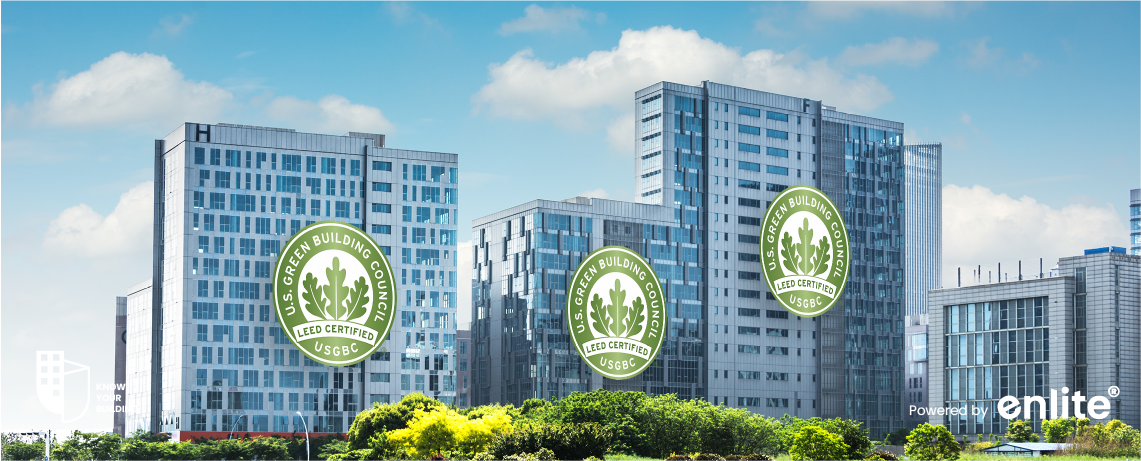Introduction
As India rapidly urbanizes, the demand for sustainable, energy-efficient, and climate-resilient buildings has never been higher. The construction sector is one of the largest contributors to carbon emissions, energy consumption, and water usage in the country. To tackle these challenges, green building certifications like LEED (Leadership in Energy and Environmental Design) play a crucial role in ensuring environmentally responsible and resource-efficient buildings.
In this blog, we will explore:
- The benefits of LEED certification for Indian buildings
- Other recognized green building certifications in India
- How smart building technologies like Know Your Building can enhance sustainability efforts
1. What is LEED Certification?
LEED (Leadership in Energy and Environmental Design) is a globally recognized green building certification system developed by the U.S. Green Building Council (USGBC). It provides a framework for healthy, efficient, and cost-saving green buildings.
LEED certification in India is managed by the Green Business Certification Inc. (GBCI), which verifies whether buildings meet sustainability standards in:
✅ Energy efficiency
✅ Water conservation
✅ Waste management
✅ Indoor air quality
✅ Material sustainability
Buildings earn points across different categories and can achieve one of the following certification levels:
- LEED Certified (40-49 points)
- LEED Silver (50-59 points)
- LEED Gold (60-79 points)
- LEED Platinum (80+ points)
India has over 1,500 LEED-certified buildings, with major corporations, IT parks, malls, hospitals, and residential complexes leading the green building movement.
2. Why Should Indian Businesses Invest in LEED Certification?
1. Reduced Operational Costs & Energy Efficiency
Buildings consume nearly 40% of total energy in India, leading to high electricity bills and grid dependency. LEED-certified buildings use:
✅ Smart energy management systems to cut electricity costs by 20-30%
✅ LED lighting, energy-efficient HVAC, and smart automation
✅ Renewable energy sources like solar panels & wind power
💡 Example: Infosys in Pune has achieved LEED Platinum certification, reducing energy consumption by 44% compared to conventional buildings.
2. Water Conservation & Sustainable Usage
Water scarcity is a growing concern in India. LEED-certified buildings ensure:
✅ Rainwater harvesting systems for non-potable water use
✅ Low-flow water fixtures that reduce consumption by 30-50%
✅ Smart water management & leak detection sensors
💡 Example: The CII-Sohrabji Godrej Green Business Centre in Hyderabad saves more than 50% of its water needs through rainwater harvesting & greywater recycling.
3. Improved Indoor Air Quality & Employee Productivity
Indian cities suffer from poor air quality, which affects occupant health. LEED-certified buildings:
✅ Monitor and optimize indoor air quality (IAQ)
✅ Use non-toxic, low-emission building materials
✅ Provide better ventilation & green spaces
💡 Industry Insight: Studies show employee productivity increases by 11% in workplaces with better air quality & lighting.
4. Higher Property Value & Market Demand
LEED-certified buildings:
✅ Attract premium tenants who prefer eco-friendly spaces
✅ Command higher lease rates & resale values
✅ Are preferred by corporate giants, MNCs, and startups
💡 Example: IT parks in Bengaluru, Gurugram, and Mumbai with LEED certification fetch 10-15% higher rental value than non-certified buildings.
5. Compliance with Government Regulations & ESG Goals
The Indian government has introduced:
✅ Energy Conservation Building Code (ECBC) – Mandating energy-efficient construction
✅ Sustainable Development Goals (SDGs) – Encouraging green infrastructure
✅ ESG Compliance – Investors now prefer sustainability-focused businesses
💡 Industry Insight: Indian firms with LEED certification & strong ESG policies receive higher investor interest and funding opportunities.
3. Other Recognized Green Building Certifications in India
Apart from LEED, several other sustainability certifications are recognized in India:
1. IGBC (Indian Green Building Council) Certification
- Developed by CII (Confederation of Indian Industry)
- Similar to LEED but tailored for India
- Certifies residential, commercial, and industrial buildings
💡 Notable Projects: Infosys campuses in Bangalore and Hyderabad are IGBC-certified green buildings.
2. GRIHA (Green Rating for Integrated Habitat Assessment)
- Developed by The Energy and Resources Institute (TERI)
- Focuses on energy & water conservation, renewable energy, and waste management
- Mandatory for all government buildings
💡 Example: The Indira Paryavaran Bhawan, New Delhi, is India’s first Net-Zero Energy building with GRIHA 5-star certification.
3. EDGE (Excellence in Design for Greater Efficiencies)
- Developed by International Finance Corporation (IFC)
- Focuses on energy, water, and material efficiency
- Popular for residential and commercial real estate projects
💡 Example: Mahindra Lifespaces uses EDGE certification for sustainable housing projects in India.
4. How Know Your Building Enhances Green Building Certifications
Green certifications like LEED, IGBC, and GRIHA require continuous monitoring of energy, water, and air quality performance. This is where Know Your Building plays a crucial role.
🔹 How Know Your Building Helps You Achieve & Maintain Certification:
✅ Real-time Energy Monitoring: Tracks energy usage & suggests optimizations for compliance.
✅ AI-Driven HVAC & Lighting Automation: Reduces waste & ensures energy efficiency.
✅ Smart Water Management: Detects leaks & optimizes water consumption.
✅ Carbon Footprint Analytics: Helps businesses track ESG goals & sustainability metrics.
💡 Decision-Maker Takeaway: A smart Building Management System (BMS) like Know Your Building accelerates the certification process & ensures continuous compliance.
5. Conclusion: Why LEED Certification is the Future of Indian Real Estate
As India moves towards a sustainable future, green buildings are becoming a key differentiator in the real estate market. Whether you are a commercial real estate developer, corporate occupier, or facility manager, investing in LEED certification offers:
✔ Lower operating costs & higher energy efficiency
✔ Improved occupant health & workplace productivity
✔ Higher property values & competitive market positioning
✔ Compliance with India’s sustainability regulations & ESG goals
The future of Indian real estate is green—are you ready?
🚀 Transform your building into a sustainable, high-performance asset with Know Your Building!
🔗 Visit Know Your Building to learn more.














